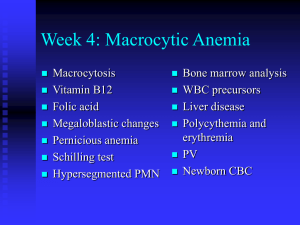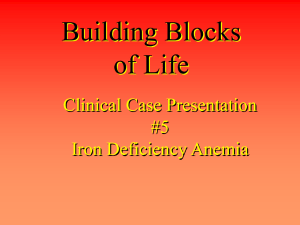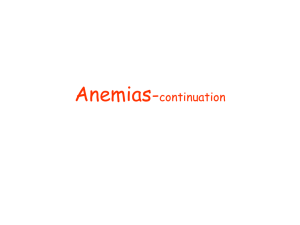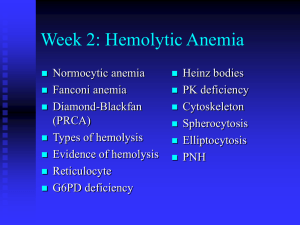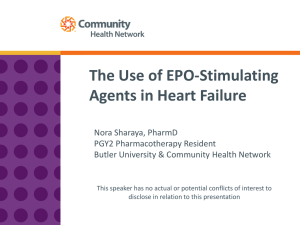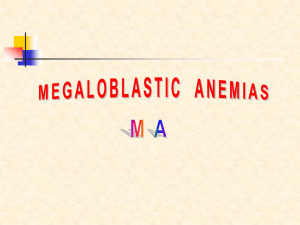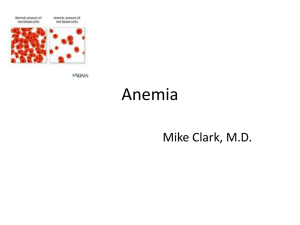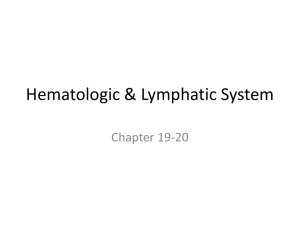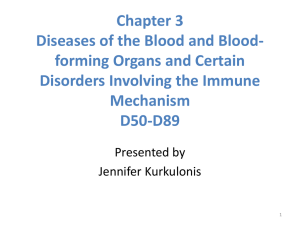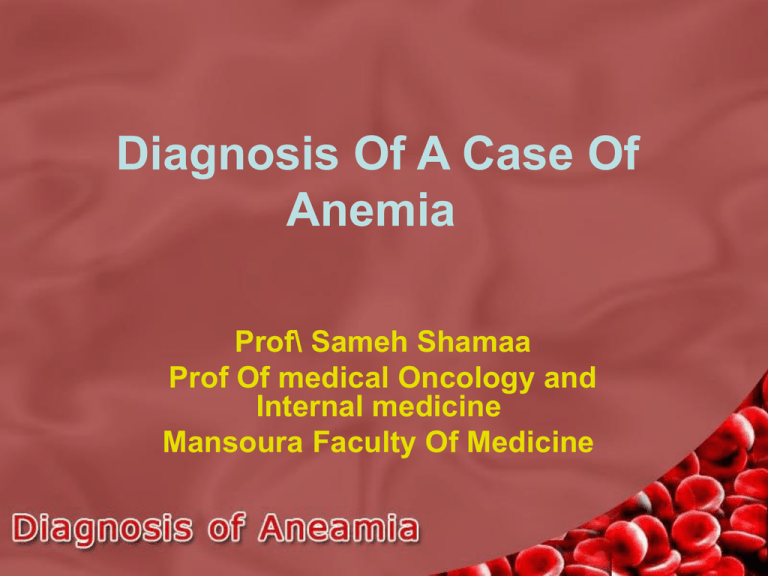
Diagnosis Of A Case Of
Anemia
Prof\ Sameh Shamaa
Prof Of medical Oncology and
Internal medicine
Mansoura Faculty Of Medicine
Anemia
Def : Reduction in the concentration Of HB
in the peripheral blood below the normal
for the age and sex of the patient:
• <13 gm. /100 ml for adult male
• <11.5 gm./100 ml for adult female & infant
• <14 gm. /100 ml for new born
False Anemia
HB concentration
Normal
↓ True Anemia
↓ False Anemia
1- Preg. 2nd trimester
2- Large spleen
3- ↑ immunoglobulin
Classification
Depends on:
I- Aetiology.
2- morphology of RBCs
both are complementary
I- Anemia due to excess red cell loss:
a) Post- haemorrhagic anemia
- Acute haemorrhagic Anemia
- Chronic Haemorrhagic Anemia
b) Haemolytic anemia
- corpuscular defect
- Extra corpuscular defect
II- Anemia due to impaired red cell formation
a) disturbance of B.M function due to deficiency
of substances essential for erythropoiesis:
- Substance essential for HB synthesis:
- Iron deficiency anemia
- Protein deficiency
- Substance necessary for DNA synthesis :
- Folic acid
- B12
b) disturbance of B.M. function Not due to
deficiency. of substances essential for
erythopoiesis
- due to B.M. infiltration
- Aplastic Anemia
III- Anemia due to other causes :
1- endocrine disorders
2- renal failure
3- Infections
4- liver disease
5- malignant disease
6- collagen diseases
Clinical Picture
The symptoms and signs are due to:
I: The anemia itself.
II: The disorder causing the anemia.
I- Clinical picture of Anemia Whatever the
cause:
A) Symptoms:
- Generalized
- C.V.S
- CNS
b) Signs :
- Pallor
- C.V.S :
Tachycardia
Murmurs
High C.O. state
Congestive heart Failure
II- Clinical picture which may indicate the
cause of anemia-:
1) History:
a) Present History :
- Age and sex
- Occupation
- Rate of onset
- History or blood loss
- History or bleeding tendency
- History suggestive of hemolysis
- History of drug intake
- G.I.T symptoms
- Bony pains
- C.N.S paraesethia
- Fever
- Diet
b) Social History
c) Menstrual and Gynecologic History
d) Family History
2) Examination:
a)
-
General examination:
Built
Skin
purpura, ecchymosis
Conjunctiva
Mouth
Nails
Blood pressure
Bones
Legs
B) C.V. examination :
- Hypertension
- Signs are usually secondary to anemia.
- Presence of organic heart disease may
suggest rheumatic activity or bacterial
endocarditis
C) Abdominal examination :
- Splenomegaly
- Hepatomegaly
- Abdominal mass
3) Investigations :
I- Determination of the morphologic type :
- Microcytic and or hypochromic .
- Normochromic (Normocytic or microcytic).
- Macrocytic (Megaloblastic or Normoblastic ).
According to :
a) MCV
b) MCHC
c) Reticulocytic count
II- Discovery of the cause :
From:- history.
- physical examination.
- blood film examination.
- Sometimes+ further special investigation.
A-Microcytic +/- hypochromic.
M.C. HC ≤ 32% and/or M.C.V ≤80N2
↓serum iron
(≤60 ug ♀or ≤ 70 ug ♂)
↓
TIBC
serum iron ↑
(≥60 ♀, ≥ 70 ♂ ug%)
Abn.Hb
with ↑Retculocytes
Sideroblastic
(congenital)
↑TIBC
↓ TIBC
Iron deficiency inflammatory Hb electrophoresis Iron stain of
BM
(Thalassemia)
If iron deficiency anemia:
Search for a source of chronic blood loss:
1)In females:
-Abnormal uterine bleeding;menorrhagia or contraceptive device.
-Gynaecologic examination for fibroids or tumours.
2)G.I.bleeding:
-Occult blood ,parasites.
-Barium meal or upper endoscopy.
-Colonoscopy or barium enema.
3)Less frequent causes:*Iron deficiency;malabsorption.
*Chronic epistaxis or hematuria.
B-Normochromic Anemia with Reticulocytosis
Reticulocytes >120. 000/mm3
M.C.V. N. or slightly ↑
Anemia with regeneration.
Normochromic Anemia with Reticulocytosis
1) signs of acute
heamorrhage
- epistaxis
- h.± melena
- hemoptysis
Post hemorrhagic Anemia
Normochromic Anemia with Reticulocytosis
2) If No evidence of He but
signs of hemolysis
and/or :
↑ indirect bilirubin
↓ Haptoglobine
Hemolytic Anemia
Search for the most commonacute causes:
*Coomb’s test *G6PD *Blood culture (septicemia)*Malaria
Normochromic Anemia with Reticulocytosis
If (1),(2) are negative
- repair of certain anemias
e.g tretment with B12 or folic
- stopage of toxins fore erythropoises.
e.g alcohol, chloramphenicol.
- Rcent unnoticed Hemorrhage.
Normochromic Anemia with Reticulocytosis
Search for abnormalities Of RBCs in blood film
Microspherocytosis
other abnormalities
in shape or size
family history and
osmotic fiagility test
Hb electrophoresis
Normochromic Anemia with Reticulocytosis
if No abnormalities In R.B.C
family history
search for abn.
- Hb
- Enzyme
- Membrane
associated chronic
disease
presence of urinary
pigmentation
if Hb
cirrhosis, S.L.E
lymphatic leuk.
Lymphoma.
repeat coomb,s
PNH
Ham’s test
C-Aregenerative Non Microcytic Anemia:
i.e., Normochromic , Normocytic or macrocytic Anemias
(MCV > 82 N2 , MCHC > 32% , reticulocytes < 120.000 )
If Hb < 8 gm., ret. Must be > 100.000 if ↓ ---- Aregenerative anemia
But anenria must be > 1 week duration
Insufficient production by the marrow
History (alcoholism, drug's …); WBCs and, platelets (i.e., do blood film)
(1) Alcoholism mod.
Macrocytosis<110
(2) Normocytic anemia
Normal WBCs &
Platelets
(3) No alcohol
+ macrocytosis
Bone marrow aspiration
Anemia of alcoholism
Creatinine, E.S.R., serum iron IBC
Endocrinal manifestation:
(4) Neutropenia
+
↓Platelets
abnormal cells
B.M aspiration
Aregenerative Non Microcytic Anemia
Creatinine, E.S.R., serum iron IBC
Endocrinal manifestation:
A
Anemia of renal failure
If –ve A, B, C
B
Endocrinal manifestation
H. assay:
e.g., myxoedema
or panhypopituitrism
Do marrow aspiration
C
Iron ↓ , ↓ TIBC
+ Fever=
Infl. Anemia
Indications of B.M aspiration
(In aregenerative non microcytic Anemias)
A- if no apparent cause
(No R.F, inflammation, Endocrinal manifestation)
and no cause of hemodilution
( huge splenomegaly; abn. Ig. Or oedema
measure the red cell mass)
B- M.C.V. > 110N3
C- if + Neutropenia ±/ Thrombocytopenia, or if
there is abnormal cells
Marrow aspiration: the following possibilities:
1- No erythroblasts
anerythroblastic anemia
2- megaloblasts .
megaloblastic anemia
3-abn. cells
B.M. infilteration
4- hypocellular marrow
5- Normal marrow
6-Malfornied erythroblasts:
Dyserythropoiesis
e.g.:
- Antimeitotic drugs
- Congenital
- Refractory anemia
Marrow Biopsy
Infilteration
Fibrosis
Aplastic
Normal
-Metastasis Medullany fibrosis aplastic anemia
-CLL
-ALL.
Anemia with N. B.M
-AML.
-M.M.
-NHL.
AREGENERATIVE MEGALOBLASTIC
1) Search for a cause of folic acid or B 12 deficiency:
-malnutrition -malabsorption -gastric resection.
-relative deficiency: multipara
chronic hemolytic anemias.
-defect in utilization:alcoholism
antifolic drugs.
For confirmation:
Measure folic acid & B12 serum
AREGENERATIVE MEGALOBLASTIC
2) If no evident cause: •
Seach for pernicious anemia •
*schilling test •
*gastric acidity test + gastric endoscopy •
*folic and B12 serum levels •
If low B12,normal folic acid,+ve schilling= •
Pernicious anemia •
AREGENERATIVE MEGALOBLASTIC
If not pernicious anemia: •
we have the following possibilities: •
-low B12, N. folic= may be diphylobothrium L •
-low folic acid----> do malabsorption tests •
-N. B12 and folic----->refractory anemia •
Thank You

